Category Archives: Study Mode


Witnesses of nativity: a godly pattern
Today as my daughter was opening the last of the nativity set, she got baby Jesus to add to the other figures.
As I thought about it, I was reminded from this year’s Christmas devotional where Elder Rasband made the statement about the role of the shepherd as witnesses and as such they were worthy and just.
It occurred to me that there are parallels between those witnesses and the witnesses who testified of the origins (nativity, if you will) of the restoration, represented by the Book of Mormon.
The Book of Mormon had three original witnesses, furthered by 8 additional witnesses. Eleven total to stand with Joseph affirming that they saw the plates from which the Book of Mormon came from.
Christ’s birth was witnessed by three wise men, a number of shepherds, and the old man at the Temple. We don’t know the exact count this comes to and undoubtedly there were others, but there is a simple symmetry there.
In both cases it would be a few years before special witnesses, apostles, would be called–but our Heavenly Father called just men to testify of His divine work, to establish the seeds of faith in an otherwise time of confusion and difficulty, which led to the more formal organization of His work in each given time.
It affirmed for me both of the restoration and the divinity of the Savior. Both have such significant roles respectively in helping us understand the who and why we worship, that God prepared a way by which people could exercise faith in the origins of that dispensation.
But the Spirit Did Not Fail Him (Alma 4)
In my study of the Book or Mormon, I came across a verse that had special meaning to me as a missionary.
As my last transfer drew to a close, It was naturally to look back and ask, ‘is there more I could have done? How did I do? Was I a good missionary?’
No immediate peace came with such contemplation. I knew my weaknesses and I was afraid that some of them were rather glaring. For example, it bothered me that I never got used to contacting. Everyday was like the first day. It never came naturally. I also had an excellent memory and could easily recall moments I wasn’t proud of.
These weighed on me. I kept working, I kept giving it my best effort, but in the back of my mind these things festered.
It was at some point near the end of my last transfer I read about Alma and the struggles and setbacks he experienced watching the Church under his watch studded a little bit:
And now it came to pass that Alma, having seen the afflictions of the humble followers of God, and the persecutions which were heaped upon them by the remainder of his people, and seeing all their inequality, began to be very sorrowful;nevertheless the Spirit of the Lord did not fail him. (Alma 4:15, emphasis added).
As I was invited at my last zone conference to speak, this verse came to mind while I was on my feet. I quickly realized that this was true for me. Yes, I struggled. Yes, there were challenges. Yes, I made some stupid mistakes. But I never gave up, I kept moving in the right direction. And most importantly, the Spirit did not fail me. I never felt alone, and recognized throughout my mission the Spirit teaching me and teaching others through me.
And if I had the spirit, that means I was worthy. Which was a witness to me that The Lord accepted my efforts.
Sometimes that is still hard for me to remember and focus on. I get impatient with myself, I feel like I should be further along in some categories. Other things don’t come as naturally as I hoped they would and I am painfully aware of where I come up short.
But let all that go for a moment and just focus on having the Spirit. That is the reminder of every sacrament meeting: that The Lord will grant His Spirit to the willing. If we will keep at it, His spirit will sustain our efforts
and help us yield fruit. And then at some future day we’ll peak back over our shoulder and realize just how far we’ve come.
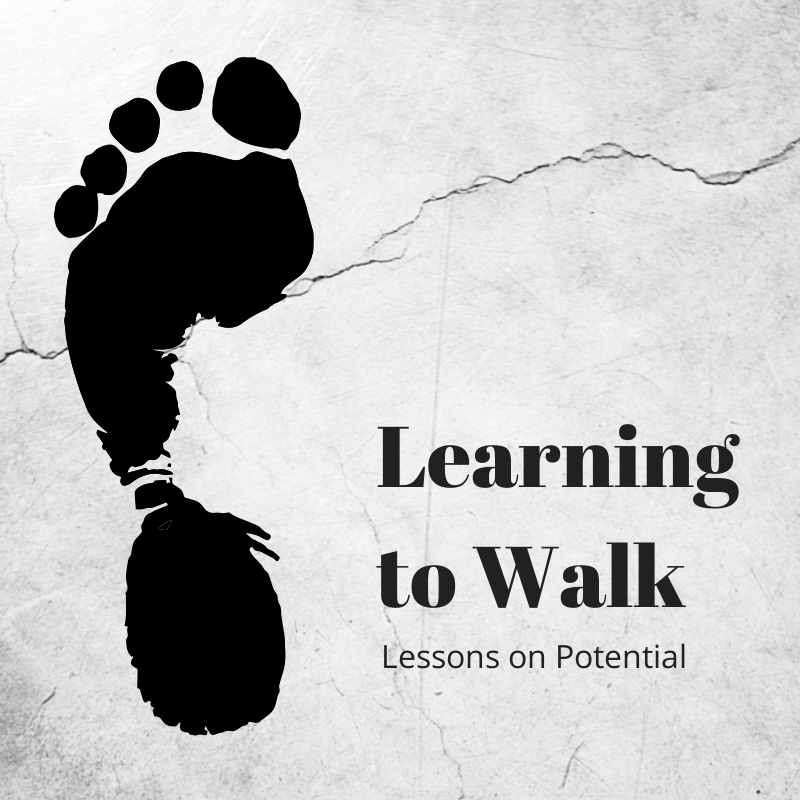
Learning to Walk: Lessons on Potential
Tonight our son, Kreed, took his first steps. He’s been pretty close for some time now. He’s a professional furniture surfer and enjoys grabbing our legs and following us as we walk. His balance has always been pretty good and he’s pretty tough when it comes to taking tumbles.
What was particularly fun to watch was after he’d taken a few steps, the excitement he got when he realized what he was doing and that he was capable of doing it.
Rewind to earlier today: I was beginning to look at Teachings of the Presidents of the Church: Joseph Fielding Smith manual that we’ll be studying in priesthood and relief society in 2014. Chapter One is on our Father in Heaven. Among other points, President Smith taught,
“I feel most assuredly that our Father in heaven is far more interested in a soul—one of his children—than it is possible for an earthly father to be in one of his children. His love for us is greater than can be the love of an earthly parent for his offspring”
Connecting the two experiences, my thoughts have turned to what it must be like for our Father in Heaven when one of us as His children, start to get it. We’ve been crawling around for so long, and we start to stretch our legs. We start to stand up straight, and we start to take steps toward Him.
And as we do that, we come to the realization that something new and exciting is before us. There’s a world of possibilities unlocking before our eyes. And with each step, our Father watches on, ever encouraging and extending His grace and support.
Understanding that, a few applications come to mind:
- Never be discouraged. Weakness and struggle is part of the growing up process.
- Don’t be afraid of failure. As children of God, we have the potential to do what God asks us to do, it just might take us time to grow into that which we’re promised.
- The Lord will provide opportunities and experiences that will help us grow but it’s ultimately up to us to take the steps.
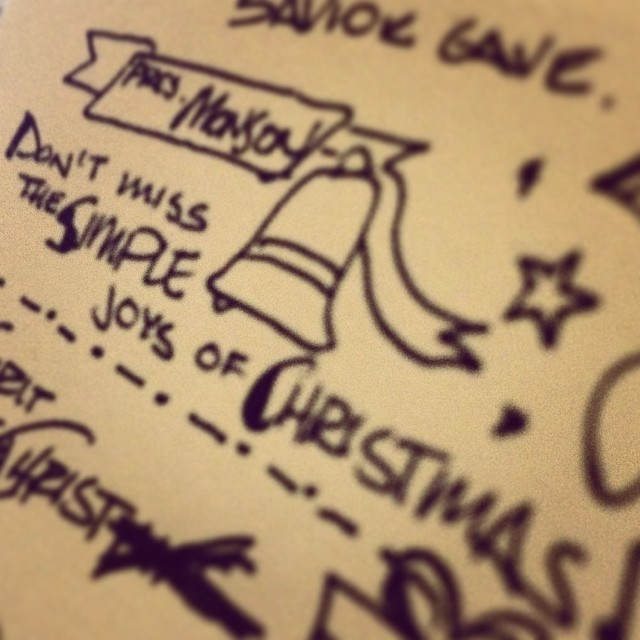
Don’t miss the simple joys of Christmas. #christmasdevo #lds #sketchnotes [Instagram]
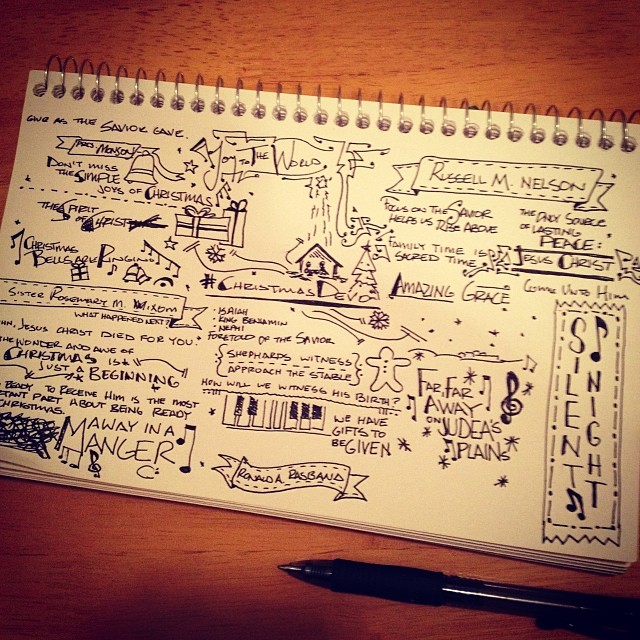
The only source of lasting peace is Jesus Christ, the Prince of Peace #christmasDevo #lds #sketchnotes [Instagram]

“The Church! I see it!” — What Olivia taught me about Church
As we were walking to Church we crossed paths with some friends from the ward. They got a kick of Olivia’s commentary on the walk:
“Icky Water,” referring to the stale puddle on the sidewalk.
“Come on, Daddy. Let’s go to Church,” she reminds as we’re about half way there.
When she saw the Church, her excitement came out in something like:
“The Church! I see it! The Church!”
Our friend commented, “Gee, I wish I felt that way every time I went to Church”
We joked a little bit about it: “Sacrament is about to start! Wahoo!”
“Yes, lesson time!”
Which really got me thinking about how I approach Church in general. In recent years, especially with the effort involved to get two small kids out the door, sometimes there’s a little dread and trepidation getting out the door.
It was good reminder to put off the natural man through the atonement of Christ and become as a little child, humble, meek, willing (see Mos. 3:19).
The Trick is to Thank the Lord for Letting You Have the Ride
President Hinckley reminded us that the trials and struggles we have in life are part of the journey:
Transcript:
I have had my head bumped and my shins barked. On some of these occasions when I have needed a laugh I have turned to a letter which I think is something of a classic, which was first published in the Manchester, England,Guardian and later reprinted in the Deseret News.
A hurricane had hit the West Indies, and a bricklayer was sent to repair the damage. He wrote to the home office as follows, and I hope you can get this delightful picture:
Respected Sirs:
When I got to the building I found that the hurricane had knocked some bricks off the top. So I rigged up a beam with a pulley at the top of the building and hoisted up a couple of barrels full of bricks. When I had fixed the building, there was a lot of bricks left over. I hoisted the barrel back up again and secured the line at the bottom, and then went up and filled the barrel with the extra bricks. Then I went to the bottom and cast off the line. Unfortunately the barrel of bricks was heavier than I was, and before I knew what was happening the barrel started down, jerking me off the ground. I decided to hang on, and halfway up I met the barrel coming down and received a severe blow on the shoulder. I then continued to the top, banging my head against the beam and getting my finger jammed in the pulley. When the barrel hit the ground it bursted its bottom, allowing all the bricks to spill out. I was now heavier than the barrel and so started down again at high speed. Halfway down, I met the barrel coming up and received severe injuries to my shins. When I hit the ground I landed on the bricks, getting several painful cuts from the sharp edges. At this point I must have lost my presence of mind because I let go of the line. The barrel then came down, giving me another heavy blow on the head and putting me in the hospital. I respectfully request sick leave.
Life is like that—ups and downs, a bump on the head, and a crack on the shins. It was ever thus. Hamlet went about crying, “To be or not to be,” but that didn’t solve any of his problems. There is something of a tendency among us to think that everything must be lovely and rosy and beautiful without realizing that even adversity has some sweet uses. One of my favorite newspaper columnists is Jenkin Lloyd Jones. In a recent article published in the News, he commented:
There seems to be a superstition among many thousands of our young who hold hands and smooch in the drive-ins that marriage is a cottage surrounded by perpetual hollyhocks, to which a perpetually young and handsome husband comes home to a perpetually young and ravishing wife. When the hollyhocks wither and boredom and bills appear, the divorce courts are jammed.
Anyone who imagines that bliss is normal is going to waste a lot of time running around shouting that he’s been robbed. The fact is that most putts don’t drop. Most beef is tough. Most children grow up to be just ordinary people. Most successful marriages require a high degree of mutual toleration. Most jobs are more often dull than otherwise. . . .
Life is like an old-time rail journey—delays, sidetracks, smoke, dust, cinders, and jolts, interspersed only occasionally by beautiful vistas and thrilling bursts of speed. The trick is to thank the Lord for letting you have the ride.
September 25, 1973 | BYU Devotional |“God Shall Give unto You Knowledge by His Holy Spirit”
A True Neighbor
What does it mean to be a true friend? Consider this,
“Our challenges will be a lot less dramatic than a tar-and-feathering; certainly they won’t involve a crucifixion. And maybe they won’t even be very personal matters at all. Maybe they will involve someone else—perhaps an injustice done to a neighbor, a person much less popular and privileged than yourself.
In cataloging life’s little battles, this may be the least attractive kind of war for you, a bitter cup you especially don’t wish to drink because there seems to be so little advantage in it for you. After all, it’s really someone else’s problem, and like Hamlet you may well lament that “time is out of joint; O cursed spite, / That ever [you were] born to set it right!” (William Shakespeare, Hamlet, act 1, sc. 5, lines 187–88). But set it right you must, for “Inasmuch as ye have done it unto one of the least of these my brethren, ye have done it unto me” (Matthew 25:40). And in times of such Doniphan-like defense, it may be risky, even dangerous, to stand true.
Martin Luther King once said,
The ultimate measure of a man is not where he stands in moments of comfort and convenience, but where he stands at times of challenge and controversy. The true neighbor will risk his position, his prestige, and even his life for the welfare of others. In dangerous valleys and hazardous pathways, he will lift some bruised and beaten brother to a higher and more noble life. [Martin Luther King, Jr., Strength to Love (New York: Harper and Row, 1963)]”
“Bitter Cup and the Bloody Baptism”
Jeffrey R. Holland, 13 January 1987.
What do they have to say?
Today we got a rare opportunity to go down as a family to the Missionary Training Center and volunteer in the TRC. It is an opportunity to help missionaries preparing to go out in the field to practice their Romanian, teaching the gospel.
In the years since I went through, they changed the format to focus on us as individuals instead of us trying to take on some assumed role (like someone who has never heard of the Church). It is simple, but I think it does a lot to help the missionaries focus on the Spirit and meeting needs instead of technique or style.
As a major part of their lesson, they focused on ‘enduring to the end, which means something totally different to me now as a father of two than it did as a student or missionary. With any previous role, it always had pretty clear statute of limitations, an expiration date, a goal line. But as a Father, and in a faith that believes the family is eternal–it is a completely different type of end than I’ve previously encountered. It’s not an end of time or material resources we’re talking about. It’s more along the lines of at the end of your wits, and ‘after all you can do’ kind of end.
So in that thought process, I considered how do I know the best way forward? I think therein lies my love and excitement around LDS General Conference.
Shortly after coming home, my Bishop shared with me his experience coming home from my mission and finding the guidance he needed to endure to the end, from conference. It is an opportunity to hear from inspired men, who have the authority to speak truth and light the path.
I know for some Conference is a chance to take a Sunday off. After all, we get it printed and we’ll hear about many of the talks in Church meetings for the next six months until the next conference.
My evidence is anecdotal, but it is personal. I believe a special spirit and degree of heightened insight comes from demonstrating to the Lord that what the leaders of the Church have to say is important to you. There’s something about that exercise of faith to prepare for and actively listen to conference that brings answers to prayers, peace to the troubled mind and a confirmation to the heart that God is not only mindful of you and your needs, but that He is actively participating in guiding the efforts of this Church.
Come and see. There truly is something for everyone.
General Conference on LDS.org
Temptation, the Power of Suggestion
As I get older, I can appreciate more and more the charge that a Book of Mormon prophet gave to “watch yourselves, and your thoughts, and your words, and your deeds,” (Mosiah 4:30).
I think its the same wisdom in ‘garbage in, garbage out’ and ‘you are what you eat.’ This has been driven home further for me as I watch my two children under the age of two develop and grow. Watching them has taught me how to recognize better how what I see or hear influences me.
The observation I am arriving at is the enhanced ability and access this gives the adversary to tempt us. In recent years, different Church leaders have affirmed that the power of Satan is real, but limited. He cannot read our thoughts, but can entice us. However, he is a damned spirit without a body, he doesn’t have the ability to reach out and affect our lives directly.
In a recent conference address, Elder L. Tom Perry cautioned us to not estimate the adversary’s determination to seek our misery since his fall from grace:
Satan, however, was not done. His backup plan—the plan he has been executing since the time of Adam and Eve—was to tempt men and women, essentially to prove we are undeserving of the God-given gift of agency. Satan has many reasons for doing what he does. Perhaps the most powerful is the motive of revenge, but he also wants to make men and women miserable like he is miserable. None of us should ever underestimate how driven Satan is to succeed. His role in God’s eternal plan creates “opposition in all things” (2 Nephi 2:11) and tests our agency. Each choice you and I make is a test of our agency—whether we choose to be obedient or disobedient to the commandments of God is actually a choice between “liberty and eternal life” and “captivity and death.”
“Obedience to Law is Liberty“, L. Tom Perry
In a day where there really are very few moral reinforcements in society, it requires a great deal of personal honesty to identify the who and what of our desires. Satan cannot directly touch us. He has no physical presence to use to impose upon us. But he does have influence, he does have the power of suggestion. How does one guard against such active and intense manipulation? How do you protect yourself from the most experienced con artist?
Elder Perry’s talk title holds clues. One of my favorite verses from the Doctrine and Covenants speaks of how obedience is a source of protection and power:
“And again, verily I say unto you, that which is governed bylaw is also preserved by law and perfected and sanctified by the same.”
D&C 88:34
May we be mindful of the adversary’s continuous onslaught and find protection and staying power through obedience to God’s laws.
Trial and Experience Necessary for Salvation
President Brigham Young taught,
“All intelligent beings who are crowned with crowns of glory, immortality, and eternal lives must pass through every ordeal appointed for intelligent beings to pass through, to gain their glory and exaltation. Every calamity that can come upon mortal beings will be suffered – to prepare them to enjoy the presence of the Lord. … Every trial and experience you have passed through is necessary for your salvation.”
Quoted, Teachings of Presidents of the Church: Spencer W. Kimball (2006), 15.
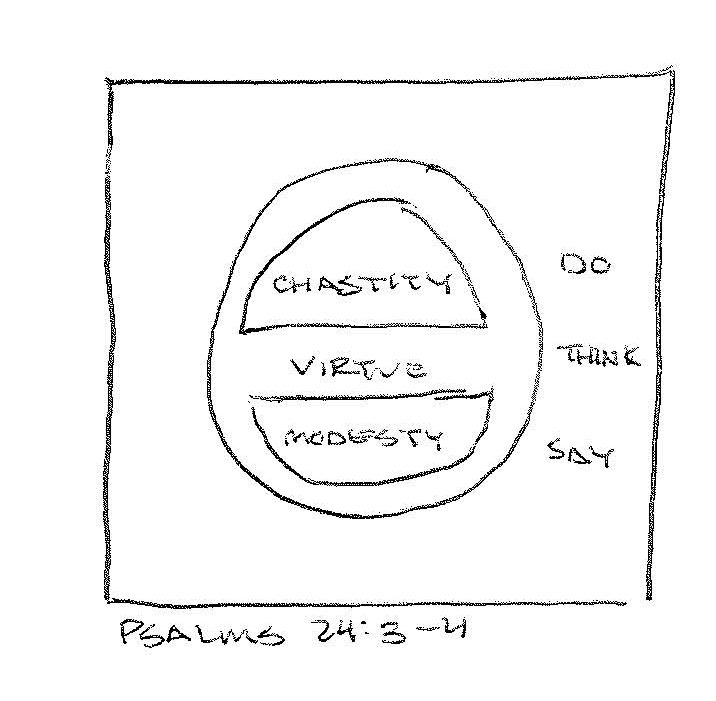
Thoughts, Words, Deeds
I have an old recording of a Harold B. Lee address entitled “Do the Right Things for the Right Reasons”. As his title suggests, he labors the point that more important than our actions, our motives are key to who we are and the purposes of this life. He makes the simple statement that stood out to me. He said, “Virtue isn’t chastity, it includes it.”
I found this doodle I had done a couple of years ago to illustrate the idea. I use the term ‘modesty’ with ‘say’ both in the context of what words we use as well as how we send messages through choices like the clothing we wear, the materials we surround ourselves with and so on.
Who shall ascend into the hill of the Lord? or who shall standin his holy place?
He that hath clean hands, and a pure heart; who hath not lifted up his soul unto vanity, nor sworn deceitfully.
Psalms 24:3-4
Choices and Agency – James E. Faust
James E. Faust reminds us that we don’t always have to touch the burner to know if a stove is hot:
Learning by experience has value, but the “school of hardknocks” is deserving of its name. Progression comes faster and easier by learning from our parents, those who love us, and our teachers. We can also learn from the mistakes of others, observing the consequences of their wrong choices.”
“Choices” James E. Faust, April 2004 General Conference

The Influence of a Father
As a family, we just finished reading the first book of Nephi in the Book of Mormon. The more if reflect back it is a powerful narrative of a family struggling to keep peace and spiritual harmony during a time of great change and hardship. What are some of the events that happen?
- The father, Lehi, receives a spiritual calling to preach repentance and foretell the destruction of Jerusalem–a very unpopular position that puts his life in peril.
- The family leaves all of their possessions behind and travels about two hundred miles south (so estimate scholars).
- Everyone in the family has to come to personal grips with the situation (Sariah, Nephi, Sam successfully do but, Laman and Lemuel never fully do causing a rift in the family).
- The brothers return in attempt to get sacred records. Their lives are threatened multiple times and they lose all their gold and silver in the process.
- They make the trip again from their father’s camp back to Jerusalem and convince another family to travel with them.
- An argument erupts on the way back and part of the family leaves one brother in the wilderness tied up to die.
- They travel through pretty harsh desert region, without the aid or warmth of fire, nor are they permitted to cook their meat
- The women bear children in these extreme circumstances
- Father-in-law dies, causing further strife, requiring divine intervention to settle
- Nephi breaks his bow, it becomes very difficult to find food for a period of time
- After years of travel, they arrive in coastal oasis with milk and honey but they’re not staying: as Nephi builds a boat an intense conflict arises in which the older brothers seek Nephi’s life.
- On the boat, as the older siblings start to get boisterous and irreverent, another fight breaks out, resulting in Nephi being tied up to the mast for many days. A storm arises and threatens the safety of all on board until Nephi is finally released.
Whew! That is a lot of stress and conflict for one family to cope with. And unfortunately its not over as shortly after Lehi’s death, Nephi and his side of the family will need to flee in the night from their brethren because their hate metastasized into an intent to kill. It will be hundreds of years before any semblance of peace between the two groups is reached.
Given all that Laman and Lemuel did in stirring up strife, threatening the lives of their family members and probably otherwise making life difficult for the rest of the family, it is all the more remarkable to me that the Lord fully intended to save and preserve their descendants. Not only that, but in the end bless them with all blessings of the Gospel.
It is very striking: Nephi, the righteous one, saw the destruction of his people because they would go on to reject the greater light, while he saw the descendants of his wicked brothers, who were kept from the full truth because of the misdeeds of their parents would take active part in being restored to full glory as members of the House of Israel in the last days.
So taking a step back, I’m led to ask what makes this all possible? How can this family make it thousands of miles under significant stress and hardship to the promised land still as a family unit? And even after that family unit dissolves, what made it possible for Laman and Lemuel’s descendants to eventually receive the fullness of the gospel?
As I pondered this question as we read, a thought entered my mind: The descendants of Laman and Lemuel are also the descendants of Lehi.
What tribute or honor could properly describe the righteous influence of a father like Lehi other than patriarch? This man, though relatively simple means, would not only provide for the temporal salvation of his family by following the Lord’s commandments, but provided the spiritual foundation for powerful civilizations on the American continent. The record thereof would then in turn bless millions of additional lives in the form of a divine witness and fruit by which men can recognize the restored gospel of Jesus Christ.
And yet, when you read the account, what did Lehi do?
- He prayed for inspiration and did his best to follow it
- He bore testimony of the Savior to the people and more importantly to his family
- He shared his spiritual experiences with his family
- He valued the scriptures and encouraged his children to do the same
- He never appears to command or coerce his family, but speaks with deep love and persuasion, with ‘all the feeling of a tender parent’
- He repented when he needed to
- He left each member of his family a blessing
And with that he was able to successfully get his family to the promised land and secure for them amazing blessings, not the least of which is a personal visit from the Savior after his resurrection. Today, Lehi’s legacy is still felt as the record of his family helps us prepare for the second coming of the Savior. How great is the influence of a father!

Art by Chris White
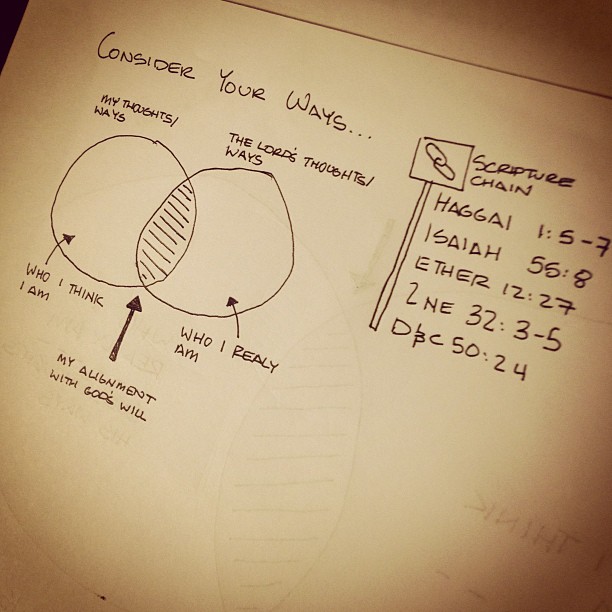
Consider Your Ways (Perception, Reality, Success)

- It wasn’t until man understood enough around the reality of gravity, air pressure and aerodynamics that Orville and Wilbur Wright got their contraption to take flight. Today there are thousands of flights in the air at any given time.
- George Washington died, in effect, from a common cold. It wasn’t until we understood how bacteria and viruses work that we could develop reliable medicine to counteract their symptoms. Even serious diseases can be completely reversed or kept in check.
- Religiously, the children of Israel throughout the Bible struggled to keep their promised land safe. But the Lord promised that to the degree they kept the commandments they would be protected.
- Christ defines Eternal Life in terms of having a true grasp of reality: “And this is life eternal, that they might know thee the only true God, and Jesus Christ, whom thou hast sent (John 17:3, emphasis added).”
- Nephi in the Book of Mormon observed that the compass they were given by the Lord worked according to the faith and diligence they gave to it.
Isaiah emphasized a similar dichotomy to our perception compared to reality. He reminded us that,
“For my thoughts are not your thoughts, neither are your ways my ways, saith the Lord.
For as the heavens are higher than the earth, so are my ways higher than your ways, and my thoughts than your thoughts (Isaiah 55:8-9).”
I think this is a statement reminds us that our own perceptions, assumptions and constructs around how we make sense of this world should always be checked for accuracy. To the children of Israel, Haggai offered on behalf of the Lord the following challenge to reflect and evaluate,
“Now therefore thus saith the Lord of hosts; Consider your ways.
“Ye have sown much, and bring in little; ye eat, but ye have not enough; ye drink, but ye are not filled with drink; ye clothe you, but there is none warm; and he that earneth wages earneth wages to put it into a bag with holes.
“Thus saith the Lord of hosts; Consider your ways, (Haggai 1:5-7).”
“And if men come unto me I will show unto them their weakness. I give unto men weakness that they may be humble; and my grace is sufficient for all men that humble themselves before me; for if they humble themselves before me, and have faith in me, then will I make weak things become strong unto them (Ether 12:27).”
- Prophetic counsel given through Church leaders at General Conference
- Divine guidance in the form of the words from ancient prophets found in the scriptures
- The sacrament gives us a chance to reflect, repent and commit anew to follow Jesus Christ
- Loving input by parents, family or friends who see a risk we might not immediately see
- Personal revelation where the Holy Ghost reminds us of the teachings of Christ (see John 14:26)
I’ll close by leaving this open ended with two links to two scriptures that can serve as jumping off points for how we might regularly consider our ways on a more regular basis:
What verses would you add? How do you ‘consider your ways’?





You must be logged in to post a comment.